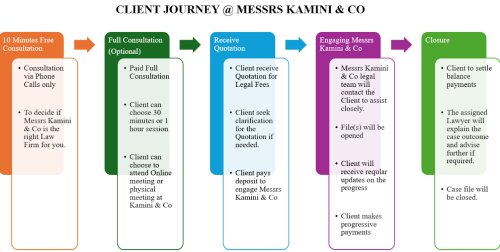Best Faith-Based Law Lawyers in Malaysia
Share your needs with us, get contacted by law firms.
Free. Takes 2 min.
Or refine your search by selecting a city:
List of the best lawyers in Malaysia
About Faith-Based Law in Malaysia
Faith-Based Law in Malaysia primarily involves the application of Islamic law, or Shariah, which is a significant aspect of the Malaysian legal system. The country practices a dual legal system where the civil courts coexist with Shariah courts. These Shariah courts have jurisdiction over Islamic personal laws and matters, including marriage, inheritance, and religious practices among Muslims. While non-Muslims are typically not subject to Shariah law, it's important for all residents and visitors to be aware of these laws due to the societal and legal culture in Malaysia.
Why You May Need a Lawyer
There are several situations where individuals may require legal assistance in the area of Faith-Based Law in Malaysia. For Muslims, these could involve matters related to marriage, divorce, inheritance, and conversion to Islam. Non-Muslims may require clarity on how certain aspects of Shariah law could affect them, especially in interfaith marriages or disputes involving custody. Additionally, businesses operating within Malaysia must adhere to Islamic business principles, and legal guidance is often necessary to ensure compliance.
Local Laws Overview
In Malaysia, Islamic law is under the jurisdiction of each state's Shariah courts, which operate alongside the civil court system. This means there can be variations in Shariah law depending on the state, making it crucial to understand the specific legal context relevant to your location. Key areas include Islamic family law, which governs marriage, divorce, and custody; criminal offenses under the Shariah enactments; and laws concerning Zakat (alms-giving) and Wakaf (endowment). Non-compliance with these laws can lead to penalties, underscoring the importance of having specialized legal counsel.
Frequently Asked Questions
What is the role of Shariah courts in Malaysia?
Shariah courts in Malaysia handle issues related to Islamic family law, including marriage, divorce, custody, and inheritance for Muslims. They operate alongside the civil judicial system.
Are non-Muslims subject to Shariah Law in Malaysia?
Generally, non-Muslims are not subject to Shariah Law in Malaysia. However, in cases involving interfaith elements, such as marriage, there might be some overlap where understanding Shariah perspectives is beneficial.
Can a non-Muslim convert to Islam in Malaysia?
Yes, non-Muslims can convert to Islam. The process involves a formal declaration and is typically carried out in a religious office or mosque. It is advisable to consult with a lawyer to understand the legal implications of conversion.
What legal challenges might arise from interfaith marriages?
Interfaith marriages can lead to complexities concerning marriage registration, custody of children, and inheritance rights. Legal advice is highly recommended to navigate these issues.
What is considered under Islamic banking and finance laws in Malaysia?
Islamic banking and finance operate under Shariah principles, which prohibit interest (riba) and encourage ethical investing. Legal counsel is crucial for compliance and understanding financial contracts.
How does Islamic law impact inheritance cases?
Inheritance for Muslims is governed by Faraid, a set of rules based on the Quran and Hadith. The distribution of an estate under Faraid can differ significantly from civil inheritance laws.
What recourse is available for disputes under Shariah law?
Disputes under Shariah law are mainly addressed by the Shariah courts. However, for issues overlapping with civil law, civil courts may also be involved.
Can decisions of Shariah courts be appealed?
Yes, there is a process for appealing decisions made by Shariah courts. The structure and possibility of appeal would depend on the specific state legislation.
How does one resolve custody disputes in Shariah Law?
Custody disputes among Muslims follow Islamic law principles which consider the best interest of the child, including religious upbringing. Legal consultation is recommended for effective resolution.
What is the significance of a religious conversion declaration?
A religious conversion declaration formalizes one's entry into Islam and impacts personal legal status. It may influence marital rights and obligations, inheritance, and custody laws.
Additional Resources
Several resources are available for individuals seeking information and legal advice on Faith-Based Law in Malaysia. These include the Department of Islamic Development Malaysia (JAKIM), state religious councils, and legal aid organizations specializing in Shariah law. Consulting with an experienced shariah lawyer can prove invaluable when navigating legal issues in this field.
Next Steps
If you require legal assistance in Faith-Based Law, consider scheduling a consultation with a lawyer experienced in Shariah matters. Legal directories and Bar Council Malaysia can assist in finding qualified practitioners. Preparing relevant documentation and questions in advance can optimize your consultation. Additionally, attending seminars or workshops may provide further insights into legal obligations and rights under Faith-Based Law in Malaysia.
Lawzana helps you find the best lawyers and law firms in Malaysia through a curated and pre-screened list of qualified legal professionals. Our platform offers rankings and detailed profiles of attorneys and law firms, allowing you to compare based on practice areas, including Faith-Based Law, experience, and client feedback.
Each profile includes a description of the firm's areas of practice, client reviews, team members and partners, year of establishment, spoken languages, office locations, contact information, social media presence, and any published articles or resources. Most firms on our platform speak English and are experienced in both local and international legal matters.
Get a quote from top-rated law firms in Malaysia — quickly, securely, and without unnecessary hassle.
Disclaimer:
The information provided on this page is for general informational purposes only and does not constitute legal advice. While we strive to ensure the accuracy and relevance of the content, legal information may change over time, and interpretations of the law can vary. You should always consult with a qualified legal professional for advice specific to your situation.
We disclaim all liability for actions taken or not taken based on the content of this page. If you believe any information is incorrect or outdated, please contact us, and we will review and update it where appropriate.
Browse faith-based law law firms by city in Malaysia
Refine your search by selecting a city.
















